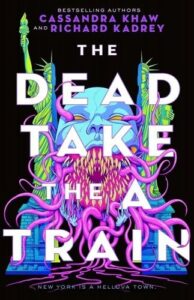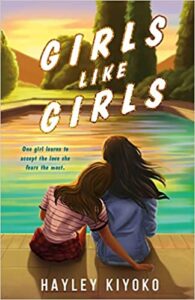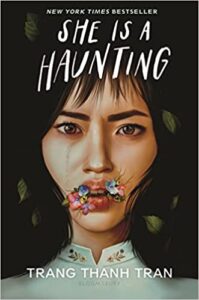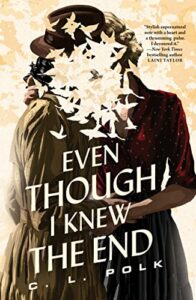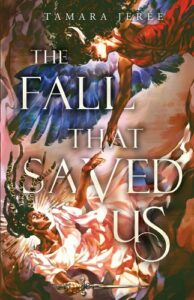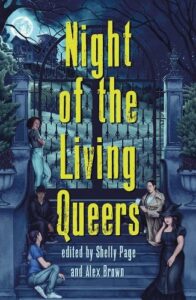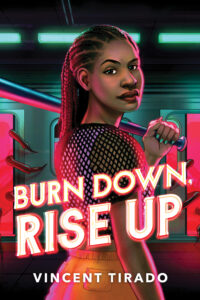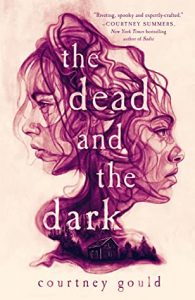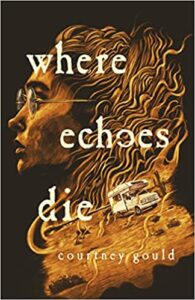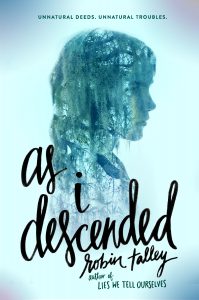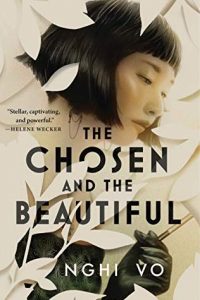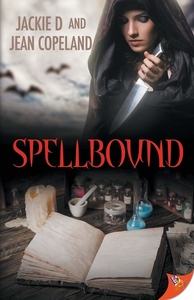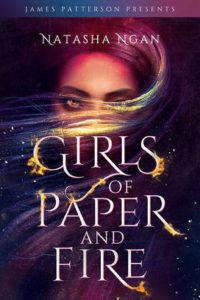Buy this from Bookshop.org to support local bookstores and the Lesbrary!
One thing about a Cassandra Khaw book: I never know what I’m getting into. Even two-thirds of the way through this, completely invested in the story, I still kept thinking, “What genre is this? And also, what’s the plot?”
Julie is a 30-year-old exorcist for hire, not quite scraping by in New York City by taking on the deadliest and most gruesome jobs carving monsters out of people and going head to head with demons. Her arms are wrapped with barbed wire magic, which she tears from her flesh in order to use those spells. She keeps a suitcase full of fresh organs in case she needs to swap any of hers out on a mission gone wrong. She also is not making enough to pay her rent, never mind support her drug habit.
She just broke up with her ex-boyfriend, Tyler, who works for an investment company that is mostly invested in souls, body parts, curses, and making deals with unfathomable gods. It’s a dog-eat-dog environment where you’re more likely to be killed gruesomely than be promoted, but Tyler loves it there, and he sometimes hires Julie for the jobs he doesn’t want to get his hands dirty for. When Julie doesn’t go along with one job, though, he plots revenge.
Just as Julie is beginning to wonder how she can possibly scavenge up any cash, her high school friend Sarah shows up suddenly at her door. She’s been secretly in love with her for years. Side note, my favourite bisexual woman stories are the ones that name a bunch of faceless ex-boyfriends, and then there’s ✨ her ✨. This is definitely one of those books. After a lot of prodding, Sarah finally admits that she’s here because she’s running from her abusive ex, Dan… and then has to make Julie promise not to torture and kill him.
And that’s sort of the plot. Two bisexual girls falling for each other while their ex-boyfriends try to ruin their lives. It’s probably the goriest book I’ve ever read—the descriptions are truly skin-crawling—but it doesn’t feel like horror to me. It doesn’t feel like I’m supposed to be afraid. If you’re the kind of person who needs to understand the magic system of a fantasy world, this is not for you. It’s a mess of different types of magic, demons, curses, Eldritch gods, and other inexplicable weirdness. It’s dense with world building, without any one structure weaving it together. This totally worked for me, but you need to just let it was over you.
In fact, I think that complements the setting well, because New York City—as the title suggests—plays a major role in this story. And this tangle of different kinds of magic felt like a reflection of many different worlds all living in parallel inside of NYC. Also, did I mention that lay people have no idea magic is real? Despite the unending encounters Julie has with possessed brides-to-be, foxes puppeting zombie bodies, and so much more, it somehow goes completely unnoticed; she can walk onto the A Train covered in blood and viscera, and no one looks twice.
In some way, it actually reminded me of a noir story. Julie is trying to track down Dan, and she is constantly getting injured. That dogged pursuit in a gritty environment while getting beaten down and somehow surviving felt like it would be at home in that genre… just with a lot more tentacles than usual.
Then, just to keep things interesting, at the heart of this gritty, gruesome, often gross story is a ridiculously cute bisexual F/F pining love story. I love a sapphic friends to lovers story. I won’t spoil it and say whether they get together in the end—also, this is only the first in a duology—but I will say the pining is not one-sided. I’m also annoyed that I had such trouble finding out if this was a queer book before I read it, because so much of the book is about Julie and Sarah’s relationship.
I feel like I’ve only scratched the surface of this big, sprawling book. I haven’t mentioned the angel, or what the plot turned out actually to be about, or Tyler’s point of view chapters, or how about halfway through the book we start to get one-off POVs from other characters. And I have to squeeze in the fact that there’s a character who is cursed to not be able to die until he has sold every book in the bookstore to the Right Customer, and as a former employee of a used bookstore, I felt that in my bones. I’m pretty sure I’ve met someone with that same curse before.
If you can stomach gore and a whole lot of weirdness, I really recommend this one. It kind of reminded me of Welcome to Night Vale, with a lot more blood. So if that’s your vibe, you need to pick this up.
Content warning: gore, blood, violence, body horror, relationship abuse (not described in detail), drug use.

